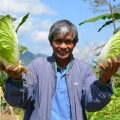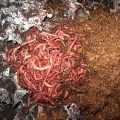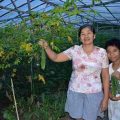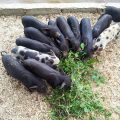Calauag, a municipality located in eastern Quezon, rears an abundance of coconut that covers more than 22,000 hectares. With the predominance of coconut in town comes the rising of yet another high-value crop, saba. Aside from being the largest fruit awardee, the saba variety grown in Calauag possesses a quality that is decidedly comparable to Mindanao’s variety. Due to the competitive quality of Calauag’s saba, the town opts to maintain and remain as a consistent and excellent supplier of this crop, making the town not only known for its vast coconut plantations but also for its premium quality saba.

“However, traditional culture of banana and other local cultivars has been unsystematic; backyard and subsistence level has no external input other than initial planting material and labor for occasional clearing and harvesting,” as stated by project leader Dr. Eduardo R. Lalas of the Quezon Agricultural Experiment Station (QAES).
Making saba organic and profitable through vermicomposting
To increase the farmers’ earnings through saba production optimization using the organic practice of vermicomposting, QAES in partnership with the Bureau of Agricultural Research (BAR) conducted the “Technology Commercialization of Vermicomposting for Saba Banana Plantation in Quezon Province”.
Previously, the Calauag local government unit implemented the “Restoring Local Agricultural Practices through Sustainable Agriculture”, a project which also promotes and supports the Organic Agriculture Act of the Department of Agriculture (DA). These projects on organic agriculture made the town one of the “prime movers” in Quezon.
“[Part of] the components of the [QAES] project are the promotion and development of organic farming and construction of vermibeds,” explained Dr. Lalas. Vermicomposting utilizes earthworms as decomposers to produce high quality fertilizer in a short period. The organic wastes are collected and mixed in a vermibed and after the decomposition process, it turns into a nutrient-rich compost called vermicast.
Identifying the best substrate for saba vermicast
According to Dr. Lalas, the idea of the project is to utilize all the available substrates found in the farm. “We selected the kinds of substrates that are not costly and are readily available in the farms,” he added. In Tiaong, Quezon where QAES is located, the proponents made use of three substrates, madre de cacao leaves, neem leaves, and banana stalks. Meanwhile, they utilized the same substrates in Calauag except for the neem leaves which were replaced by maria-maria leaves instead.
The first phase of the project aimed to identify which of these substrates is the most helpful and cost-effective in procuring significant improvements in the quality of saba. The ratio of their vermicast is 75 percent substrate and 25 percent cow manure. After the soil analysis and comparative analysis conducted by QAES and the Regional Soils Laboratory, it was found that madre de cacao and neem produced the most favorable outcomes. But as observed by the proponents, madre de cacao is found almost anywhere in the locality making this substrate more economical for the farmers. Dr. Lalas also informed that if the objective is to rapidly reproduce the African Night Crawler (ANC), the best substrate to use is the banana stalks.
Commercializing and expanding the vermicomposting technology
Initially, three saba farmers from Brgy. Kigtan and Brgy. Viñas were identified as the project’s farmer cooperators. Staff from QAES assisted in setting up three vermibeds per farmer. From three farmers, the number of cooperators instantaneously expanded. “As of today, there are 16 vermicast production sites in 13 different barangays including the project sites in Kigtan and Viñas. Each unit has the capacity of producing 1,000 kg of vermicast in a year,” a promising result of the project as told by Dr. Lalas.
In 2011, all the project participants including the farmers, members of Municipal Agriculture and Fishery Council (MAFC) and DA staff underwent capacity-building trainings and seminars on vermicomposting. Among the topics discussed were cultural management practices, banana propagation, pest and disease management, and vermicomposting technology commercialization.
The vermicomposting sites in Barangays Pinagkamaligan, Kinalin Ibaba, Kalibo, Patihan, Pandanan, Anahawan, Sumilang, Sta. Milagrosa, Doña Aurora, Bantulino, Apad Lutao, Lagay, Tiniguiban, Kapaluhan, and the two project sites produced 5,601 tons of vermicast in January 2012. Seeing this notable outcome, QAES decided to raise the production to 26 tons which entails the establishment of ten more units.
Gaining more through vermicomposting
The farmer cooperators witnessed the significant improvements of their saba plantation and harvest through the use of vermicomposting. The plants became healthier-looking and more resistant to diseases. The yield also increased and the quality of harvest improved significantly.
Some farmer cooperators are already selling their vermicast and ANC worms to nearby locales and some are already producing vermitea, an organic liquid fertilizer brewed from the vermicast. “We are planning to expand the technology adoption in Tagkawayan, where there are portions planted with saba,” said Dr. Lalas. QAES will also impart the technology in all the local government units not only for banana production but also for other crops.
“In Calauag, vermicomposting is not utilized only in saba farms but also in Gulayan sa Paaralan,” said Dr. Lalas. The utilization of vermicast in Calauag won the municipality first place in District IV and second place in the provincial level of Developing Agriculture through Vegetable Production Integration Drive in School (DAVPIDS) (Gulayan sa Paaralan).
Through the technology commercialization of vermicomposting in Quezon, not only saba farmers but all farmers in general will surely continue to reap better harvest and higher income.
by Leila Denisse Padilla, www.bar.gov.ph






